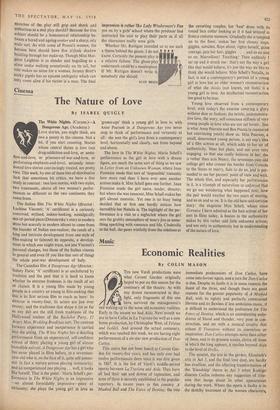Cinema
The Nature of Love
By ISABEL QUIGLY The White Nights. (Curzon.)—A Dangerous Age. (Academy.) LOVE stories, you might think, are two a penny in the cinema. Not a bit, if you start counting. Stories whose central theme is love (not drug-addiction-and-love, or ambi- tion-and-love, or prisoners-of-war-and-love, or Performing-elephants-and-love), seriously inten- tioned love stories convincingly treated, are pretty tare. This week, by one of those bits of distributive luck that sometimes hit critics, we have a fine study in contrast : two love stories, with two styles, two treatments, above all two women's perfor- Mances as different as the two continents they come from.
The Italian film The White Nights (director : Luchino Visconti; 'A' certificate) is a curiously contrived, stylised, indoor-looking, nostalgically out-of-period piece (Dostoievsky's story in modern dress but scarcely in modern idiom) to come from the founder of Italian neo-realism; the result of a long and intricate development from one style of film-making to (almost) its opposite, a develop- ment in which one might trace, not just Visconti's • Personal changes, but those of the Italian cinema in general and even (if you like that sort of thing) , the whole post-war development of Italy.
, The Canadian film A Dangerous Age (director : Sidney Furie; 'A' certificate) is so uncluttered by • tradition and the past that it is hard to know Whether its extreme freshness is the result of art or chalice. It is a young film made by young People in a country so young in film-making that • this is its first serious film to reach us here : its director is twenty-four, its actors are just over twenty; and the traditions that shape it (in so far as any do) are the still fresh tra(litions, of the Hollywood realism of the Bachelor Party, 12 Angry Men, Wedding Breakfast sort. The contrast , between experience and inexperience is carried , into the acting. The White Nights has a dazzling performance from an experienced, self-confident actress of thirty playing a young girl of almost incredible naivete; A Dangerous Age has a girl who has never played in films before, as a seventeen- year-old who is, on the face of it, quite self-posses- sed. In fact a mature actress playing immaturity; and an inexperienced one playing ... well, it looks like herself. That is the point : Maria Schell's per- formance in The White Nights is an impressive —an almost formidably, impressive—piece of virtuosity; she plays the young girl in love as 'grown-ups' think a young girl in love is; with Anne Pearson in A Dangerous Age you never stop to think of performance and virtuosity at all : she sees the girl's love from a contemporary level, horizontally and clearly, not from beyond and above.
The love in The White Nights, Maria Schell's performance as the girl in love with a dream figure, are much the same sort of thing as we saw in Letter from an Unknown Woman, where Joan Fontaine made that sort of 'impossible' romantic love more real than I have ever seen another actress make it. Miss Schell goes one further. Joan .Fontaine made the girl naive, tender, dreamy; but where she was innocent, Miss Schell makes her girl almost moronic. Yet one is so busy being dazzled that at first one hardly notices how incredible her Natalia is. The highlight of the per- formance is a visit to a nightclub where the girl sees the grubby atmosphere of weary jive as some- thing sparkling with romance and life. Cinderella at the ball, she peers wistfully from the sidelines at the cavorting couples, her 'best' dress with its roUnd lace collar looking as if it had strayed in from a costume museum. Gradually she is tempted on to the floor, makes her first clumsy steps, giggles, subsides, flops about, rights herself, gains courage, pats her hair, giggles . . . and so on and so on. Marvellous! Touching ! Then suddenly I sat up and it struck me : that's not the way a girl like that would behave, it's just the way we like to think she would behave. Miss Schell's Natalia, in fact, is not a contemporary's portrait of a young girl in love but an older woman's reconstruction of what she thinks (not knows, not feels) is a young girl in love. An intellectual reconstruction too good to be true.
Young love observed from a contemporary level, with today's flat exterior covering a glory without date or fashion; the brittle, undemonstra- tive love, the wary, self-conscious stiffness of very young people in love who are not yet lovers : that is what Anne Pearson and Ben Piazza (a mannered but convincing youth) show us. Miss Pearson, a small, determined young person, is not one's idea of a film actress at all, which adds to her air of authenticity. Neat but plain, and not even very engaging, so that one really believes in her she is rather than acts Nancy, the seventeen-year-old college girl who crosses the border from Canada to the States to marry, fails to do so, and is per- suaded to see her parents' point of view and wait. The whole film, and especially her performance in it, is a triumph of naturalism so unforced that we go out wondering what happened next, how the pair would weather the two years of waiting, and so on and so on. It is the old hare-and-tortoise story : the exquisite Miss Schell, whom since Gervaise I have admired as the best actress of her sort in films today, is beaten in the authenticity stakes by this rather odd little unknown actress; and not only in authenticity but in understanding of the nature of love.


































 Previous page
Previous page